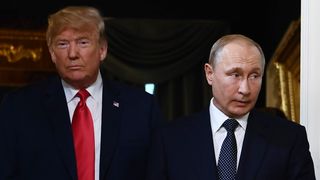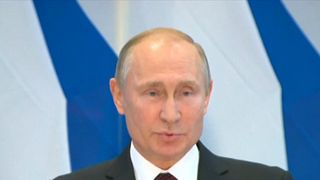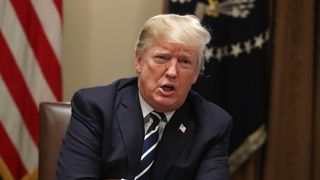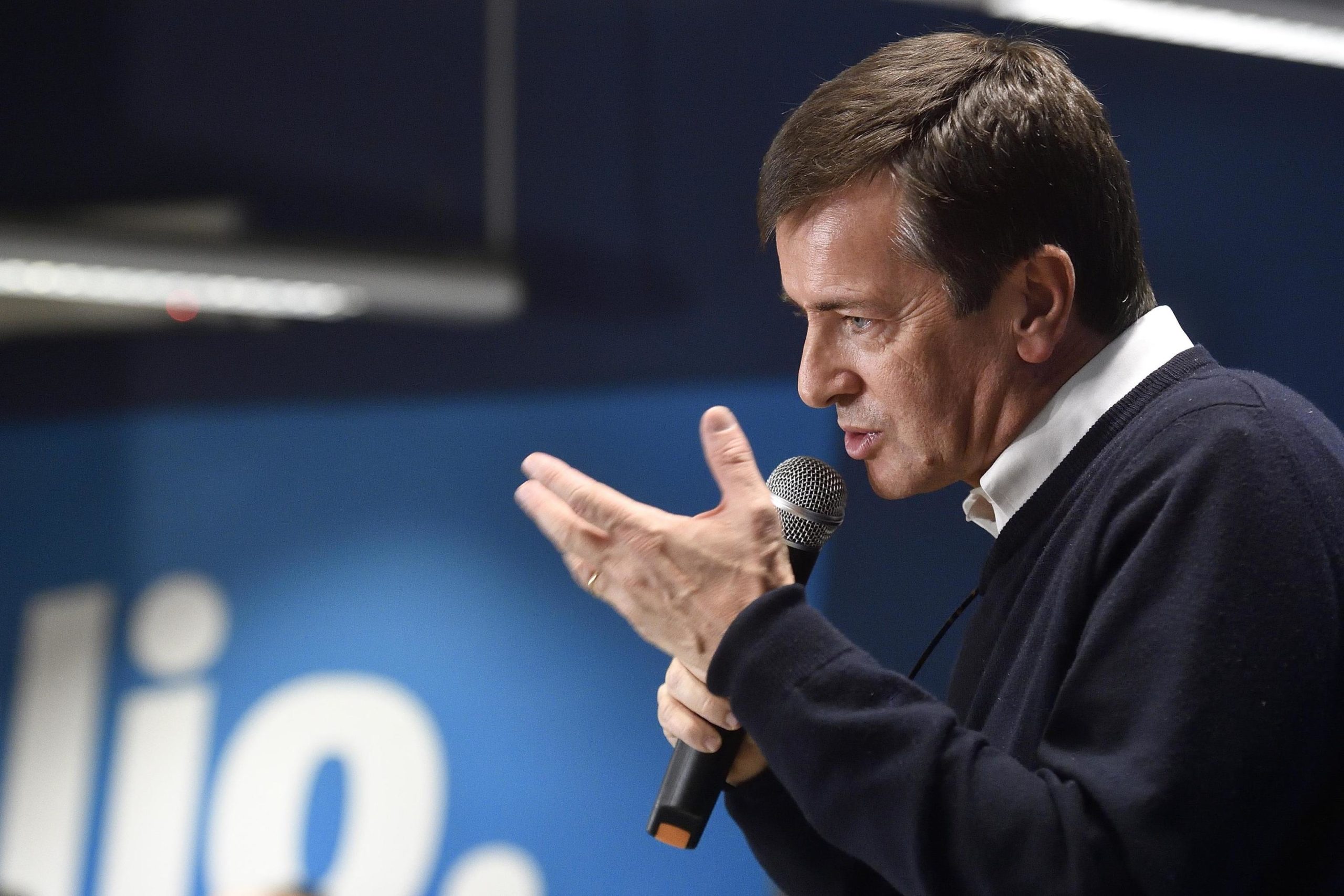Donald Trump has ordered a "vast" effort to protection American elections from foreign interference, as a top security chief warned: "Our democracy is in the crosshairs."
Responding to criticism that the White House has no clear strategy to protect US democracy, the president's national security adviser John Bolton said: "President Trump has not and will not tolerate interference in America's system of representative government."
Mr Bolton said the president is "leading unprecedented action to punish Russia" for its efforts to disrupt American elections.
Mr Trump sparked a bipartisan outcry after publicly undermining the conclusions of his own intelligence agencies regarding Russian interference.
"I have great confidence in my intelligence people, but I will tell you that President Putin was extremely strong and powerful in his denial today," Mr Trump said after talks with the Russian president in Finland last month.
Amid a fierce backlash, the president backtracked and said he accepted the findings from the intelligence community.
The comments from his national security adviser, contained in a letter to Senate Democrats, came as top US intelligence and security figures voiced fears about potential attempts to influence the 2018 midterms and 2020 presidential election.
Homeland security chief Kirstjen Nielsen pulled no punches, saying during a White House briefing: "Our democracy is in the crosshairs."
Meanwhile, Director of National Intelligence Dan Coats said: "We continue to see a pervasive messaging campaign by Russia to try to weaken and divide the United States."
Ms Nielsen and Mr Coats appeared alongside National Security Agency director General Paul Nakasone and FBI Director Christopher Wray in an attempt to reassure the American public that they are doing all they can to counter the threat.
"Our focus here today is simply to tell the American people we acknowledge the threat, it is real, it is continuing, and we're doing everything we can to have a legitimate election," Mr Coats said.
He added: "It is pervasive, it is ongoing, with the intent to … drive a wedge and undermine our democratic values."
 12:39
12:39Ms Nielsen, Mr Wray and Mr Nakasone held a cybersecurity summit in New York City with leaders of top finance, energy and communications companies earlier this week, where they spoke of the pressing need for a collaborative approach to security.
Mr Nielsen told the event that the cyber threat is now greater than the danger of a physical attack on the US by a hostile foreign group.
Mr Wray told reporters that compared to 2016, in 2018, "we are not yet seeing the same kind of efforts to specifically target election infrastructure," but that other efforts to influence public opinion continue.
The officials said the illegal activity includes criminal efforts to suppress voting and provide illegal campaign financing, cyber attacks against voting infrastructure, along with computer intrusions targeting elected officials and others.
 0:26
0:26"In regards to Russian involvement in the midterm elections, we continue to see a pervasive messaging campaign by Russia to try to weaken and divide the United States," Mr Coats said.
"We will continue to monitor and warn of any such efforts."
The FBI has opened investigations into election interference, with the officials telling the briefing that Russians have tried to "hack into and steal information from candidates and government officials alike".
Russia is not the only country trying to undermine US elections, according to Mr Coats, who did not elaborate.
 2:53
2:53Politicians from both parties have pushed election security towards the top of the agenda, amid increased concerns about interference by Russians and others ahead of November's congressional elections.
As well as Russian interference with social media campaigns, politicians are also looking at strengthening election infrastructure in the states.
This is despite Congress blocking a recent bid to boost federal funding for local and state systems.
More from Donald Trump
The issue of Russian interference has dogged President Trump's time in office, with a federal special counsel leading a criminal investigation into the 2016 presidential election, and any possible cooperation between Moscow and Mr Trump's campaign.
Mr Trump has been steadfast in denying there was any collusion between his victorious campaign and Russia.
Donald Trump has ordered a "vast" effort to protection American elections from foreign interference, as a top security chief warned: "Our democracy is in the crosshairs."
Responding to criticism that the White House has no clear strategy to protect US democracy, the president's national security adviser John Bolton said: "President Trump has not and will not tolerate interference in America's system of representative government."
Mr Bolton said the president is "leading unprecedented action to punish Russia" for its efforts to disrupt American elections.
Mr Trump sparked a bipartisan outcry after publicly undermining the conclusions of his own intelligence agencies regarding Russian interference.
"I have great confidence in my intelligence people, but I will tell you that President Putin was extremely strong and powerful in his denial today," Mr Trump said after talks with the Russian president in Finland last month.
Amid a fierce backlash, the president backtracked and said he accepted the findings from the intelligence community.
The comments from his national security adviser, contained in a letter to Senate Democrats, came as top US intelligence and security figures voiced fears about potential attempts to influence the 2018 midterms and 2020 presidential election.
Homeland security chief Kirstjen Nielsen pulled no punches, saying during a White House briefing: "Our democracy is in the crosshairs."
Meanwhile, Director of National Intelligence Dan Coats said: "We continue to see a pervasive messaging campaign by Russia to try to weaken and divide the United States."
Ms Nielsen and Mr Coats appeared alongside National Security Agency director General Paul Nakasone and FBI Director Christopher Wray in an attempt to reassure the American public that they are doing all they can to counter the threat.
"Our focus here today is simply to tell the American people we acknowledge the threat, it is real, it is continuing, and we're doing everything we can to have a legitimate election," Mr Coats said.
He added: "It is pervasive, it is ongoing, with the intent to … drive a wedge and undermine our democratic values."
 12:39
12:39Ms Nielsen, Mr Wray and Mr Nakasone held a cybersecurity summit in New York City with leaders of top finance, energy and communications companies earlier this week, where they spoke of the pressing need for a collaborative approach to security.
Mr Nielsen told the event that the cyber threat is now greater than the danger of a physical attack on the US by a hostile foreign group.
Mr Wray told reporters that compared to 2016, in 2018, "we are not yet seeing the same kind of efforts to specifically target election infrastructure," but that other efforts to influence public opinion continue.
The officials said the illegal activity includes criminal efforts to suppress voting and provide illegal campaign financing, cyber attacks against voting infrastructure, along with computer intrusions targeting elected officials and others.
 0:26
0:26"In regards to Russian involvement in the midterm elections, we continue to see a pervasive messaging campaign by Russia to try to weaken and divide the United States," Mr Coats said.
"We will continue to monitor and warn of any such efforts."
The FBI has opened investigations into election interference, with the officials telling the briefing that Russians have tried to "hack into and steal information from candidates and government officials alike".
Russia is not the only country trying to undermine US elections, according to Mr Coats, who did not elaborate.
 2:53
2:53Politicians from both parties have pushed election security towards the top of the agenda, amid increased concerns about interference by Russians and others ahead of November's congressional elections.
As well as Russian interference with social media campaigns, politicians are also looking at strengthening election infrastructure in the states.
This is despite Congress blocking a recent bid to boost federal funding for local and state systems.
More from Donald Trump
The issue of Russian interference has dogged President Trump's time in office, with a federal special counsel leading a criminal investigation into the 2016 presidential election, and any possible cooperation between Moscow and Mr Trump's campaign.
Mr Trump has been steadfast in denying there was any collusion between his victorious campaign and Russia.











